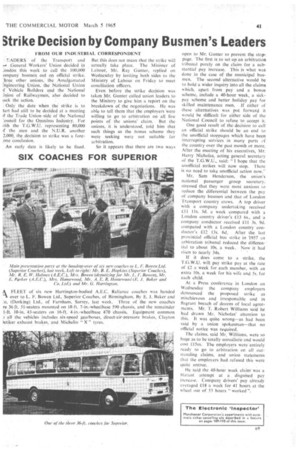Strike Decision by Company Busmen's Leaders
Page 43

If you've noticed an error in this article please click here to report it so we can fix it.
FROM OUR INDUSTRIAL CORRESPONDENT • FADERS of the Transport and General Workers' Union decided in .onclOrt this week to call the 100.000 ompany busmen out on official strike. 'tree other unions, • the Amalgamated .,ngineenng Union. the National Union .f Vehicle Builders and the National Mien of Railwaymen, also decided to pack the action.
Only the date when the strike is to tart had still to be decided at a meeting .fthe Trade Union-side of the National T:otnicilfor the Omnibus Industry. For vith the T.G.W.U. representing 80,000 ■ f the Men and the N.U.R. another 2,000, the decision to strike was a fore:One conclusion.
An early date is likely to be fixed. But this does not mean that the strike will actually take place. The Minister of Labour, Mr. Ray Gutsier, replied on Wednesday by inviting both sides to the Ministry of Labour on Friday to meet conciliation officers.
Even before the strike decision was taken Mr. Gunter called union leaders. to the Ministry to give him a report on the breakdown of the negotiations. He was able to tell them that the employers were willing to go to arbitration on all five points of the unions' claim. But the unions, it is understood, told him that such things as the .bonus scheme they were . seeking were not suitable for arbitration.
So it appears that there are two ways
open to Mr. Gunter to prevent the stop-. page.. The first is to set up an arbitration tribunal purely on the claim for a substantial pay increase. This is what was done. in the case of the municipal busmen. The second alternative would be to hold a wider inquiry into all the claims which, apart from pay and a bonus scheme, include a 40-hour week, a sickpay scheme and better .holiday pay for skilled maintenance men. If either of these alternatives was put forward it would be difficult for either side of the National Council to. refuse to accept it.
One good result of the decision to call an official .strike should be an end to the unofficial stoppages which have been interrupting services in many parts of the country over the past month or more. After the meeting of his executives, Mr. Harry Nicholas, acting general secretary of the T.G.W.U., said: "I hope that the unofficial strikes will now stop. There is no need to take unofficial action now."
Mr. Sam Henderson, the union's national passenger group secretary, stressed that they were most anxious to reduce the differential between the pay of company busmen and that of London Transport country crews. A top driver with a companyi undertaking received LIII Is. 3d. a week compared with a London country driver's £13 6s., and a company conductor received il 1 3s, 9d. compared' with a London country 'con
ductor's £12 13s. 6d. After the last provincial official bus strike in '1957 an arbitration tribunal reduced the ditTeren• tial to about 10s. a week. Now it had riSen to nearly 34s.
If it does conic to a strike, the T.G.W.U. will pay strike pay at the rate of £2 .a week for each member, with an extra i0s. a week for his wife and 5s. for each child.
At a Press conference in London on Wednesday the company employers denounced the proposed strike as mischievous and irresponsible and in flagrant breach of dozens of local agreements. Mr. I. Robert Williams said he had drawn Mr. Nicholas' attention to this. It was quite wrong—as had been said by a union spokesman—that no official notice was required.
The claims, said Mr. Williams, were so huge as to be totally unrealistic and would cost £l5m. The employers werc'entirelY ready to go to arbitration on all outstanding claims, and union statements that the employers had refused this were quite untrue.
. He said the 40-,hour week claim' was a blatant attempt at a disguised pay increase. Company drivers' pay already averaged i18 a week for 41 hours at the wheel out of 53 hours " worked




























































































































































